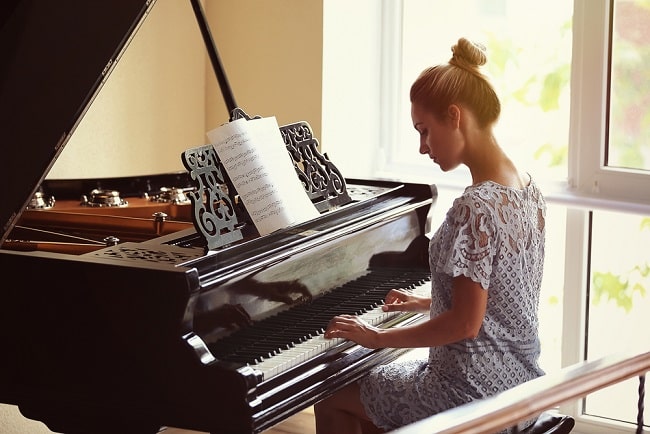
Learning to play the piano without a teacher is quite possible these days. There are so many lessons, videos, and resources online. With a combination of available resources and determination, you should be able to make progress.
Can You Learn the Piano Without a Teacher?
Learning the piano comes down in large part to practicing, which you do without a teacher. So if you’re very self-motivated and you find the right assistance online, you might do quite well.
There are some very successful self-taught pianists. Art Tatum is perhaps the most famous self-taught jazz pianist. He taught himself to play by ear. Some self-taught pianists have developed new techniques which wouldn’t have happened had they had traditional piano lessons.
There is a case to be made that teachers pass along technique and interpretation through the years so strictly that nobody has a different take on a piece of music. Self-taught pianists can sometimes approach a song in a fresh way. So it can potentially be beneficial.
It’s much harder to be self-taught as a classical pianist. Some concert pianists may well have had some time being self-taught, but virtually all have had years of proper training with experienced teachers. So if your goal is to play a classical piano recital, a teacher is probably essential.
If you start teaching yourself the piano and you have a very keen musical ear, you might find yourself picking out the notes on the piano by trial and error and avoid learning to read music. There’s nothing wrong with this – it’s a great skill to have. But so is reading music – and reading music opens up a world of possibilities when it comes to what you can learn.
There are many online tutorials on how to read music, so it’s very possible to learn this skill by yourself. Practice reading notes every single day for five or ten minutes and you should get good quite quickly.
If your goal is to play some popular songs on the piano with some basic chords, this should be fairly easy to accomplish. If you want to do a bit more than that I would go to your local music store and ask advice on a good beginner tutorial book. That, combined with a variety of tutorials on YouTube should be enough to get you going.
However, if you want to learn to play the piano really well, and learn classical piano pieces rather than play songs with chords, it will be much harder without a teacher. It’s so easy to get into bad habits that you can’t possibly know about when you work alone. Bad habits can lead to bad results in the sound you make on the piano – for instance, using too much pedal or using the wrong fingers to get from one note to the next.
Not only that, but, more importantly, bad posture and too much tension at the piano can result in injury, aches, and pains, or headaches from hunching or tensing, all of which a teacher can identify early and correct.
A teacher does far more than impart knowledge and guide practice. A good teacher inspires and urges a student forward with their studies. A teacher can be a ‘muse’ to an aspiring student and introduce them to new composers and pieces of music they might not have encountered left to their own devices.
Have you ever wanted to impress a teacher with your work simply because you want to make them proud? This is something that is missing from being self-taught and in itself is incredibly valuable. If you know that you have a lesson coming up in a few days, you are far more likely to practice and achieve your goal. If you haven’t got any lessons coming up it’s very hard to sustain the motivation especially when it gets difficult.
Without a teacher, it’s probably going to be a long, slow journey, but not an impossible one. Having a teacher who knows the journey and can tailor a path especially for you is another very valuable thing to have. A teacher knows what pieces to start with, which pieces naturally follow on, and can even guide you through taking exams which can propel you forward. These are things that are extremely difficult alone.
If you are going to self-teach yourself the piano, here are some tips: Learn to read notes. Having the notes in front of you is a form of guidance. Work out how to get from one note to another by working out the fingering and write your finger numbers onto the score. Go slowly and play each hand separately first, looking up at the music rather than looking down at your fingers.
Once you’ve got a song going along, record yourself playing and listen back. Compare what you hear with another recording – either a professional one or someone playing the piece on YouTube. Hang out with friends who play, or who are learning, and see what you can learn from them. Playing with a small group of friends who play other instruments is invaluable and great fun.
Finally, if you get discouraged, seek out more support – and consider going to a teacher. Even having a few lessons is better than none.
